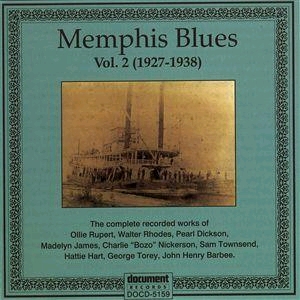
here is the NFO file from Indietorrents
01 Ollie Rupert – I Raised My Window and Looked at the Rising Sun
02 Ollie Rupert – Ain’t Goin’ to Be Your Lowdown Dog
03 Walter Rhodes – The Crowing Rooster
04 Walter Rhodes – Leaving Home Blues
05 Pearl Dickson – Twelve Pound Daddy
06 Pearl Dickson – Litttle Rock Blues
07 Madelyn James – Stinging Snake Blues
08 Madelyn James – Long Time Blues
09 Charlie ‘Bozo’ Nickerson – What’s the Matter Now Part 1
10 Charlie ‘Bozo’ Nickerson – What’s the Matter Now Part 2
11 Charlie ‘Bozo’ Nickerson – Bozo’s Blues Part 1
12 Charlie ‘Bozo’ Nickerson – Bozo’s Blues Part 2
13 Sam Townsend – I’m Missing That
14 Sam Townsend – Lily Kimball Blues
15 Hattie Hart – I’m Missing That Thing
16 Hattie Hart – I Let My Daddy Do That
17 Hattie Hart & Allen Shaw – Coldest Stuff in Town
18 Hattie Hart – Happy Go Lucky Blues
19 George Torey – Married Woman Blues
20 George Torey – Lonesome Man Blues
21 John Henry Barbee – Six Weeks Old Blues [take 1]
22 John Henry Barbee – Six Weeks Old Blues [take 2]
23 John Henry Barbee – God Knows I Can’t Help It
24 John Henry Barbee – You’ll Work Down to Me Someday
25 John Henry Barbee – Against My Will
Taken from the Document Records website:
“The city of Memphis has been linked with the blues since W.C. Handy updated ‘Boss’ Crump’s political campaign song of 1909 and published it as ‘The Memphis Blues’ in 1912. This was, of course, a formal composition but when ‘race’ recordings really took off in the 1920’s a whole underworld of blues activity was discovered to be in existence in the city, centred on the ‘black’ thoroughfare of Beale Street. Beale was rough; joints such as Pee Wee’s, The Hole In The Wall and Jim Kanane’s revelling in a reputation for having a man for breakfast’ everyday – even though ‘you never find a dead Nigger on Beale’; the implication being that bodies were quickly hauled out and dumped elsewhere. But there was another side to the Memphis Blues. It was born from the Country Blues, predominantly from the south, Tennessee and north Mississippi areas, which were drawn in by Afro-Americans from outlying rural areas looking for work and bringing their music with them.
Memphis was evidently a lively town and that reflected in the music that could be found there, particularly in blues and jazz that could be found in the Beale Street area. The second of two powerful volumes (see also Document DOCD-5014), this CD presents another twenty five tracks of superb country blues from the “pre-war” period. In addition to the standard of performances featured, the collection is interesting because of its array of lead instruments. It is hardly surprising that Memphis was the home of the jug bands and arguably the birth place of Skiffle. Ollie Rupert’s brilliant guitar accompaniment, provided by Will Shade, is joined by a jaunty Jew’s Harp. Walter Rhodes uses an accordion to move things along. On The Crowing Rooster he tells us that he’s going to buy a rooster, presumably to “crow fo’ day”. Yet his farmyard vocal effects tells us that he needn’t waste his money. Barrelhouse piano playing is provided to good effect by Judson Brown on the Charlie “Bozo” Nickerson sides. George Torey fires off some ringing guitar accompaniments on his National steel bodied guitar and country blues guitar fans won’t be disappointed by the strong performances given by Sam Townsend and John Henry Barbee. Elsewhere, there are many first rate guitar accompaniments care of Will Weldon, “Pet” and “Can” (Maylon and Richard Harney), Allen Shaw (see also Document DOCD-5015) and Willie Borum. Unlike many album collections featuring country blues, Memphis Blues Volume 2 has a reasonable percentage of women blues singers, revealing that Memphis Minnie, though not having to worry about the competition too much would have done well not to underestimate the strong performances put in by Hattie Hart and Pearl Dickson, Madelyn James and Ollie Rupert.”
